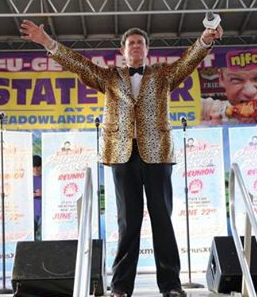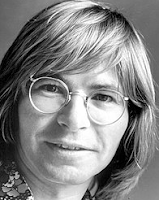 |
| Bruce Morrow |
Morrow's first stint in radio was in Bermuda at ZBM-AM, where he was known as "The Hammer."
Morrow began his stateside career at New York Top 40 station WINS in 1959. In 1960, he moved to Miami for a brief stint before returning to the New York airwaves the following year on powerhouse 77WABC. Morrow's returned to New York City came at the precise moment that rock and roll music was exploding across the Baby Boom demographic and Morrow found himself on the most powerful radio station on the East Coast at the onset of the British Invasion.
"Cousin Brucie" quickly became a success on WABC's teen-oriented evening shift in the 6:15 p.m. to 10:30 p.m. slot. Morrow became a commercial radio powerhouse and household name through his ability to maintain a rapport with his listeners while smoothly mixing the diverse musical genres of the time (Motown soul, pop, hard rock, surf music, novelty records), and then seamlessly segueing into commercials for youth-oriented sponsors like Thom McAn shoes, local clothing outlets in the New York and New Jersey areas, and events such as concerts and drag-strip races.
He served at WABC for 13 years and 4,014 broadcasts until August 1974, when he jumped to rival station WNBC 660 AM; after three years there, he left the airwaves to team with entrepreneur Robert F.X. Sillerman to become the owner of the Sillerman Morrow group of stations, which included WALL; WKGL, now WRRV, in Middletown, New York; WJJB, later WCZX, in Poughkeepsie, New York; WHMP in Northampton, Massachusetts; WOCB in West Yarmouth, Massachusetts; WRAN (now dark) New Jersey 1510 in Randolph, New Jersey; and television station WATL Atlanta. The group later purchased WPLR in New Haven, Connecticut.
In 1982, Morrow returned to the DJ role with New York's WCBS 101.1 FM. Initially, he filled in for Jack Spector every third Saturday evening for the Saturday Night Sock Hop program. Following Spector's resignation in 1985, Morrow took over the show and renamed it the Saturday Night Dance Party. The station also added his nationally syndicated show Cruisin' America. In 1986, he took on the Wednesday evening slot, where he hosted The Top 15 Yesterday and Today Countdown. In 1991, the Wednesday show became The Yearbook, focusing on music from a year between 1955 and 1979. Cousin Brucie was also the "breakfast presenter" on Atlantic 252 from 1992 to 1996.
When Cruisin' America ended its run in December 1992, Morrow continued hosting a WCBS show called Cruising with the Cuz Monday evenings until the end of 1993. After that show ended, he hosted the Saturday night and Wednesday night shows there until the station's change to the adult hits format called Jack FM on June 3, 2005. Shortly thereafter, he signed a multi-year deal to host oldies programming and a weekly talk show on Sirius Satellite Radio.
Morrow recently hosted programs for Sirius XM satellite radio, on the '60s on 6 channel. Today Cousin Brucie is hosting a Saturday evening oldies show on former Musicradio 77WABC in NYC.
➦In 1963...the term 'Beatlemania' was coined, as The Beatles made their first major TV appearance from the London Palladium. The BBC had an audience of 15 million tuned in. Thousands of delirious fans jammed the streets outside the theater to voice their support of the Fab Four. A few months later, Beatlemania would sweep the U.S. as well.
➦In 1967...CBS Radio Network canceled "House Party". Art Linkletter discusses his years in radio.
Sponsored by General Electric, the 25-minute House Party premiered on CBS Radio on January 15, 1945, and ran weekdays at 4 p.m., three days a week, through January 10, 1947. Following a break, it then ran weekdays at 3:30 p.m. from December 1, 1947 to December 31, 1948. It continued to be sponsored by General Electric even as it switched to ABC Radio, where it ran for 30 minutes in the same timeslot from January 3 to July 1, 1949. ABC then aired it as a 25-minute sustained-advertising program weekdays at noon from September 19 to December 30, 1949.
The show returned to CBS Radio only days later, making its longest continued run from January 2, 1950 to October 13, 1967 as a 30-minute show running weekdays at various times. Sponsors included Pillsbury from 1950 to 1952, and Lever Brothers from 1952 to 1956. During its first season, the soundtrack from the TV show was run immediately on radio following the telecast.
➦In 1974...Ed Sullivan died from esophagal cancer at the age of 73 (Born September 28, 1901). He was a TV personality, impresario, sports and entertainment reporter, and syndicated columnist for the New York Daily News and the Chicago Tribune New York News Syndicate. He is principally remembered as the creator and host of the television variety program The Toast of the Town, later popularly—and, eventually, officially—renamed The Ed Sullivan Show. Broadcast for 23 years from 1948 to 1971, it set a record as the longest-running variety show in US broadcast history. "It was, by almost any measure, the last great TV show," said television critic David Hinckley. "It's one of our fondest, dearest pop culture memories."
His column, "Little Old New York" for the New York Daily News, concentrated on Broadway shows and gossip. Sullivan soon became a powerful starmaker in the entertainment world himself, becoming one of Walter Winchell's main rivals. Sullivan continued writing for The News throughout his broadcasting career.
Throughout his career as a columnist, Sullivan had dabbled in entertainment—producing vaudeville shows with which he appeared as master of ceremonies in the 1920s and 1930s, directing a radio program over the original WABC (now WCBS) and organizing benefit reviews for various causes.
In 1941, Sullivan was host of the Summer Silver Theater, a variety program on CBS, with Will Bradley as bandleader and a guest star featured each week
He introduced numerous acts to audiences and the show featuring the Beatles on February 9, 1964 is one of the milestones in popular culture, viewed by 73 million people.
➦In 1990...News anchor Douglas Edwards died of cancer at the age of 73. He anchored CBS's first network nightly television news broadcast from 1946–1962, which was later to be titled CBS Evening News.










































